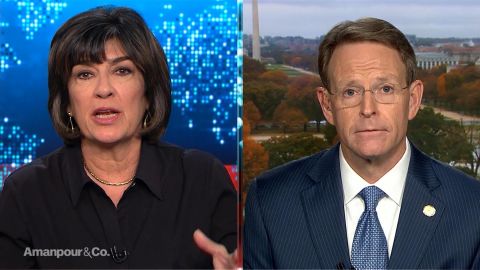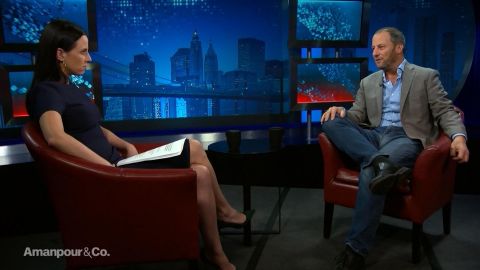Read Transcript EXPAND
The New Yorker writer George Packer believes that people are branded by badges of identity, not of thought, for example, women versus men and red versus blue, not good versus bad.
Packer tells our Alicia Menendez how in the age of Trump, fear is also drowning out moderate Republican voices.
Thank you so much for joining us.
Thank you for having me.
You've written extensively about the midterm elections, one of your most recent articles was about tribalism in America, looked at a study that asks questions about tribalism.
What did that research find?
Yeah it was a group called 'More in Common and the report was called 'Hidden Tribes' because what they did was they wanted to find out what people believe beneath their political opinions, what are their worldviews, what values do they hold, so they surveyed eight thousand Americans and they end up dividing them into seven tribes based on answers to questions about child rearing, about tradition and authority, about personal responsibility versus social circumstance and from left to right, there are progressive activists, traditional liberals, passive liberals, sort of the checked-out moderates, traditional conservatives, devoted conservatives.
And what they found is the two extremes - progressive activists, devoted conservatives - are only about 18 or 20 percent of the population.
But they're the people we hear the most from.
We hear the most from them, they're on cable news the most, their tweets are the loudest.
They're the ones who are most engaged in politics.
They're also the whitest and the highest income and the closer you get to the middle, the more the income drops and the more minorities there are.
So the picture is of very educated well-off people on each extreme making a fair amount of noise with very strong convictions and not believing in compromise or in looking for the middle ground and then a lot of people in the middle who feel ignored by the political system, not heard, and who wish there were more compromise and who find the tribalism of our politics depressing.
Do you buy this notion of tribalism?
To some extent, I do.
I mean I've always felt that there is no secret majority waiting to vote for Michael Bloomberg.
That's a myth that technocrats and you know people on Wall Street may cherish.
There really are a lot of people in this country who are polarized from each other, who don't know how to talk to each other, who look at the political opponent and see an adversary if not an enemy.
But the categories obviously are going to break down once you examine them too closely because nobody is simply affiliated that neatly with one group, there are all sorts of ways in which it gets complicated when you start asking a lot of questions.
For example a lot of people believe racism is a serious problem in America, I think 80 percent, but around the same number are opposed to affirmative action in higher education.
So when you ask where are the racists, where the white supremacists, well it turns out there's a lot of people who might make you think they're in that category on the basis of one question but are not on the basis of another, in other words people are more complicated than our politics gives them room to be.
You wrote something that stood out to me perhaps because I am the mother of a small child, you write, 'People who would never tolerate cruelty are lying or even ordinary impoliteness in their children cheer every excess of their leaders, none more so than President Trump.'
I mean I talked to Trump supporters who are kind, generous people who I would count on in crisis and whose children are exactly as I as I described in there and I avoid the subject of politics because I don't want to hear why they're for him and I don't want to get into that argument, which is a hopeless argument in almost every case.
I'd rather think of them as the people who you know helped me build a fence or who whose kids babysat for my kids than the people who support a president who I think is morally the worst president in the history of the country.
What do you say to those who think that then makes you complicit in allowing what's happening now to happen?
We have to live, we're human beings.
If politics takes over everything we're all going to be destroyed by it.
I think there are those who would argue that that is an argument that one can make from a position of privilege, that being that being white, that being male are privileges.
And yet that survey found that when it comes to, for example, things like political compromise, or taking personal responsibility, or things that maybe seem more like either middle of the road or even center right positions, the overwhelmingly white progressive activists are less likely to be for that than black moderates or passive liberals or whatever tribe comes from that survey.
So it may well be that, yeah I can sit here and say I want to talk to my neighbors even if they're for Trump, but I think if that's really about privilege then we're all doomed because it means either you're privileged, or you're going to disintegrate and descend into a maelstrom and be chewed up by it.
I think everybody who wants to live has to be able to find a way to talk to people they disagree with.
If we can't do that, I really do despair for our future and I do despair for our future, by the way, I'm not in the least bit optimistic, but at least try to have a margin where politics can't infect every relationship.
In your most recent article that came out today, you profile congressman Ryan Costello.
Why him?
Because he was willing to talk to me.
It's not easy to get Republicans to talk to the New Yorker.
At least it wasn't for me.
I tried what I thought would be the path of least resistance, retiring Republicans and even then it was hard.
He's retiring after two terms because the Pennsylvania Supreme Court redrew the districts of the congressional districts in Pennsylvania, redrew the lines very unfavorably for him.
And rather than try for re-election in a Democratic district, he retired.
He is, he will retire.
But he's also open an interesting and spontaneous and fun to talk to so I spent quite a bit of time with him right.
And also it seemed reading the article, struggling to reconcile his values, his ethics and what his responsibility is to speak out against the president of his own party.
Right, he represents a suburban Philadelphia district.
It's a moderate district.
He is a classic moderate Republican, tax cuts, you know deregulation, fairly progressive on social issues, cares a lot about climate change, guns, so in other words he has practically no future in the Republican Party as it now is constituted, he's a nearly extinct creature I think and a lot of them are retiring so they'll be even less common on the on the battlefield.
He is appalled by a lot of what President Trump does but he's also a loyal soldier in the Republican conference in the House of Representatives.
He is very admiring of Paul Ryan, Speaker of the House and you know, when it comes down to it, that's his team and he generally votes with them, but he tweets and speaks on cable news quite openly and critically of the president, so that makes him a fairly rare Republican in Washington these days.
And there was a time when standing up against your own party was lauded as brave, as respectable.
We're no longer living in that moment.
I remember when I was younger, senators like Howard Baker of Tennessee, Daniel Patrick Moynihan of New York, others who were mavericks, that was the word that people used, and it was a compliment, and even if their party leaders were frustrated by them, and their party activists were pissed off that they couldn't count on their votes, they had there was a grudging respect and sometimes a really deep respect for those two senators and people liked them, and now you know if there's someone analogous it might be Jeff Flake of Arizona.
Who frustrates Republicans and who Democrats believe does not go far enough.
Exactly, you can't win if you're Jeff Flake.
No matter what you do - you could give a speech or even write a book as he did, is denouncing the Republican Party, I mean saying things that any liberal Democrat would be cheering.
It's not enough because he still votes for tax cuts and to repeal Obamacare and for Brett Kavanaugh.
And so for Democrats, he it's worthless, it's just words; for Republicans he's a traitor and his approval ratings are, I think like close to the single digits and he had to retire because Donald Trump and the party base went after him, so he too is a nearly extinct Republican.
You wrote in the same article, 'Moderates are seen as more expendable than conservatives.'
Why can't those members of Congress that grapple with the president find their voice?
Well those who do are sort of isolated.
There is a caucus or a group called the Tuesday Group, about 50 Republicans who meet on Tuesdays and are somewhere near the center.
They just don't have much clout in Congress because the party leadership, Paul Ryan, the speaker, and the people around him, have to keep their eye on their right wing, which is the freedom caucus, the same number 40 or 50, but they have the power because they can threaten the leadership with a block vote to get rid of them.
They did that with John Boehner, the predecessor Paul Ryan, and they have the activists and the media and really the heart of the party on their side.
So is what's limiting them then a fear that they won't be effective or fear that they'll be voted out.
The latter.
I mean fear, I asked Charlie Dent why aren't more Republican sorry Charlie Dent is another moderate Republican from Pennsylvania who has already retired in the middle of the term, so he's out, but he was probably the most outspoken congressional Republican since Trump got elected.
Costello voted for Trump, Dent did not, so there's a bit of a distinction between them.
I asked Dent, 'Why are so few Republicans speaking against the president when the grounds for doing so are just overwhelming?'
And he said, 'My answer in one word is 'fear.'' So fear of not getting reelected, fear of a primary challenger, fear of, I guess being shunned, being excommunicated.
So would you call Costello a victim of tribalism?
Yeah in a way he is, he's someone who, no matter your party affiliation, you kind of want people like that in Congress.
He takes policy seriously, he studies the issues hard, he is sort of old fashioned in believing that you know your committee assignment is really important and you know reading the bill is important and making your way up the hierarchy is important- he started out like as a town supervisor and then a county commissioner.
If that kind of politician goes away and everyone is a loud mouth on CNN or Fox and becomes nationally known for having a quick and nasty thing to say, then that's that's a pretty poor version of representative government.
We're in a moment where much of our partisan politics is also commingled with identity politics - that's not new.
No, it's ancient because people vote and believe and act sometimes in accordance with who they are.
Who am I, the groups of various kinds that you belong to.
For a long time Republicans claimed to rise above that, that they were speaking to Americans and they were speaking to the middle class in the Heartland and it was the Democrats who are just a bunch of special interest based on identity.
It turned out that all the while, the Republican Party was moving toward their own version of identity politics.
You don't see it clearly, but I think Newt Gingrich is the beginning of this because he introduced a level of partisanship that was so intense and no holds barred and so disregarding of norms and ethics that it turned Washington into sort of a kind of World War 1-style trench warfare and over the years the Republican trench, because it was so fixed and static and so willing to to do anything to win, became more and more the white working class trench that was that became the Republican Party's base and once that was their base they kept pushing both language and issues in that direction.
Sarah Palin is a very good example.
I see a line from Gingrich to Palin to Trump.
Trump has finally given it full throated unapologetic expression from the very top of our government but it was beginning a long time ago, 20 years ago with Gingrich and Gingrich, now and surprisingly, is a big fan of Donald Trump because they understand each other, they speak that same tribal language which is both partisan Republican and also it's the interest of white Americans, white Christian and rural Americans.
That's the Republican Party today.
Democrats certainly have their own identity politics as well.
Yes, yes.
I mean Hillary Clinton's campaign always singled out and kind of called out the different groups in her coalition and this is sort of a normal democratic thing to do- gay Americans, straight Americans, black Americans, white Americans, Hispanic- to name every identity group and then to kind of say, 'But we're all in this together,' but really what some voters here is just the names of the groups and so they don't think this is all of us, they think no she's actually talking about certain groups and that didn't work very well in 2016 because she was both handicapped by that focus and also by being a traditional establishment politician in a year when a lot of Americans wanted to blow the establishment up.
So it didn't, I think it's a dead end and I think a candidate who tries to make, for example Me Too into the rallying cry of the 2020 campaign is not going to be able to escape the the trap that the Democratic Party sometimes sets for itself.
Thank you so much George.
My pleasure.
About This Episode EXPAND
Christiane Amanpour speaks with Tony Perkins, president of the Family Research Council, about the white evangelical vote; and Gloria Steinem & Christine Lahti about women’s votes. Alicia Menendez speaks with journalist George Packer about political tribalism.
LEARN MORE


